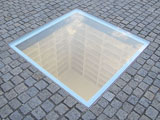The world in general, US Americans and Muslims in particular, and the Commander of American forces in Afghanistan most definitely, have been much exercised over the last week by the approaching days of Eid, a three-day holiday that marks the end of the fasting month of Ramadan, and that happens this year to coincide with the ninth anniversary of the “9/11” attacks and, as if these two were not enough, a threatened burning of Qurans in Florida by a Pastor named Terry Jones.

Initially I was relieved to hear that the Pastor Jones of the biker moustache was not the same Terry Jones as the one who gave us
Monty Python and the Holy Grail, and who had already got himself into enough hot water with the Christian right for “Life of Brian”. Towards the end of the week, however, as things became increasingly dangerous and surreal, I began to wish the Pythons were responsible. They would at least have known how to deflect the heat: “Oh, don’t mind him, he can’t help it, he’s from Gainesville.”

Well, I didn’t want to touch it at the time, but now that some of that heat has died down, I’d like to mention a few aspects of this explosive kerfuffle that have received a little less attention.

Firstly, and I’m certainly not alone in this, it strikes me as very odd that members of an American Christian evangelical congregation would be familiar enough with the Quran to have one sitting on their shelf next to the Book of Mormon and other heretical texts, let alone one that they would have set aside, as it were, for the next barbeque. Neither does it seem likely that they would have planned far enough ahead to have previously and inconspicuously picked up a second-hand copy for 50 cents at a garage sale and be just waiting for the right occasion to conflagrate. In other words, however much they might despise and revile this book, they must have been constrained to go out and openly buy their Qurans (Excuse me, does this edition burn easily?) either at their local Islamic centre or, with slightly greater anonymity, at their local bookstore if they’re lucky enough to live near the kind of rare outlet that carries sacred literature other than lifestyle gurus, the new age meanderings of seagulls and the collected aphorisms and prophecies of Chief Sitting Bull. Thus, when General Petraeus said that such an action would endanger the lives of US troops and when President Obama called it a recruitment bonanza for Al Qaeda, they were not only describing the
ways that extremists would take revenge, but also the
means that would pay for them: two points for the Arab street, dock ten points for Pastor Jones.

| |



 Memorial to the Memorial to the
1933 Nazi book-burning,
Bebelplatz, Berlin |
Secondly, book burning in general is a bad move, however strongly you might feel. Many of the hundreds of books burned by the Nazis on Opernplatz in Berlin (today Bebelplatz,
see below) went on to become cornerstones of the post war literary revival, and however much Salman Rushdie may have suffered for publishing “The Satanic Verses”, that famous Fatwa certainly had a most positive effect on his bank balance. How many people have a copy of the book at home that they bought out of principle and have never even read? ... more than a few, my friend, more than a few.

Thirdly, it should be noted that the Quran, in the strictest sense, is only valid in its original. A Muslim theologian once explained to me, with considerable emphasis, that the book I had read was
not the Quran, because that book only exists in Arabic. Therefore, I could not even have an opinion on it. I’m sure Great-great-Grandfather would have agreed with the gentleman. Sir Tristan would have described such a Florida book-burning, had it taken place (and assuming the Qurans were in English or any other language than Arabic), as a purely symbolic act, and symbolic acts are a quite a broad step away from sacrilege. So here we can score one point for Pastor Jones and dock one off the Arab street (and another for being noisy. Sorry, dears, rules is rules).

Fourthly, there is another, more mystic, tradition, which holds the sacred text only to be “inherently itself” in its most immanent form: as the holy word from Allah, revealed via the Archangel to the soul of the Prophet. This makes all printed Qurans mere paper, ink, glue and thread. For many of the faithful such Gnostic thinking is, of course, heresy, as it questions even the validity of the Arabic “original” by placing revelation above the
letter, and thus above the
law: ergo, very dodgy ground, points even.

And lastly, as a concerned environmentalist, I resent the toxic implications of book-burning almost as much as the social and religious ones. Dear people, if you must take out your anger on literature or sacred verses, at least consider composting as a viable, more sustainable, less threatening and above all less “incendiary” alternative.
©
Edwin Drood, September 2010